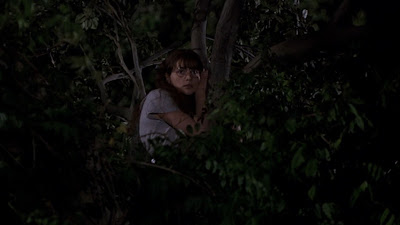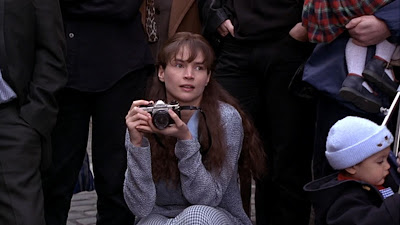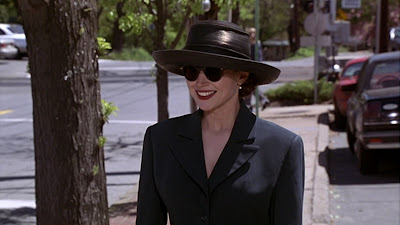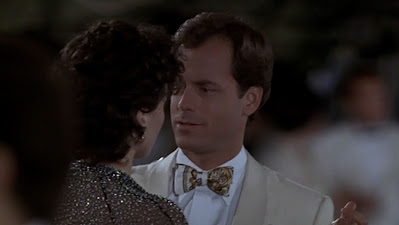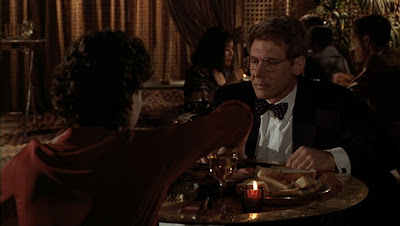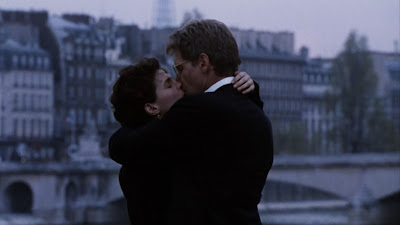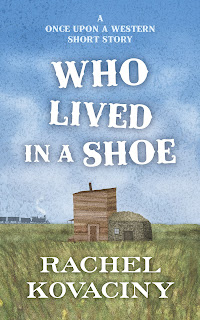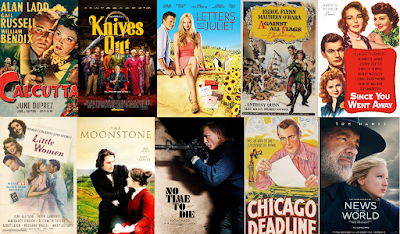It's hard to even know where to start when I talk about
Sabrina (1995) and how much this movie has meant to me over the last breathless quarter of a century.
I was fifteen and a half when Sabrina was released to theaters. My family didn't go to a lot of movies in the theater at that time, so I didn't get to see it for months and months. I was already a devoted Harrison Ford fan, thanks to his turns as Indiana Jones and Han Solo, and I was blessed with parents who were also fans of his, so I knew I would get to see Sabrina eventually. I didn't like most romantic comedies much yet at that age, but Ford's presence meant I didn't care if it was not "my kind of movie."
In the mid-'90s, it would be something like six months after a movie left the theater before it arrived at the local video stores for rental. And then another three to six months before it became available for purchase. While we waited for it to reach our video stores, one of my best friends gave me the novelization by Deborah Chiel for my sixteenth birthday. It took me a long time to decide whether or not I was going to read the book before I got to see the movie -- in fact, I can't remember anymore if I decided to see the movie first or not. I know I got the book first, because my friend wrote something in it about tiding me over while I waited for the real thing. But I almost think I may have held off on reading it.
Anyway! Sabrina finally arrived at our small North Carolina town. My parents rented and watched it themselves, and decided it was clean enough for us kids. And my whole family fell in love with this movie. My dad liked it so very much that he rented it for us every weekend for months and months, until it finally was released for sale on home video. One of our video stores was right next to Pizza Hut, and for basically that whole spring, one of my parents would run to town on Friday evening and come home with a pizza, breadsticks, and Sabrina.
My friends sometimes called the year I turned sixteen my "Sabrina year." Because, just like the title character who leaves home as a painfully shy, frowsy, un-fashion-conscious girl and comes home a glamorous woman, the year I was sixteen, I cut my waist-long hair short, dyed it black, discovered fashion, became sleek and gorgeous almost overnight, and fell madly in love with a millionaire.
Just kidding. But I did get my ears pierced, trade my dorky glasses for contacts, start growing out the bangs my mom had insisted I had to have all my life, and fall in love... with Bobby Darin and his music. And I started to open my protective shell where I kept my true thoughts and ideas and feelings hidden most of the time. I got bolder about making my own choices and decisions, little by little. Was that because of Sabrina? Maybe, actually. But not so much because of the character Sabrina, but because of the man she falls in love with: Linus Larrabee. And not for the obvious reason that he's played by Harrison Ford at his most gorgeous.
Let me explain.
Sabrina Fairchild (Julia Ormond) lives with her father (John Wood) on the Larrabee estate somewhere on the north shore of Long Island. Her father is a chauffeur for Maude Larrabee (Nancy Marchand) and her adult sons, Linus (Harrison Ford) and David (Greg Kinnear). Linus runs the multi-bazillion-dollar Larrabee Corporation, with some input from Maude, while David spends his life gadding about with random beautiful women, playing tennis, losing track of what day it is, and buying Picassos.
Teenage Sabrina is obsessed with David. She almost stalks him, except she's too shy to actually do that. She hides up in trees to watch him dance with other women at parties, she saves pictures of him from magazines, and she yearns to be the sort of person he would notice. But she has long hair and dorky glasses and wears tall socks and long dresses, which in Hollywood Code equals being frowsy and dowdy and unnoticeable.
Sabrina's father is concerned by her obsession with David Larrabee. I think he's not so much worried that she'll end up getting arrested for actual stalking as that she'll throw herself in David's way and end up heartbroken or pregnant or both. So he arranges, with Maud's help, to get Sabrina a job in Paris as an assistant to a magazine editor.
In Paris, Sabrina makes many mistakes, gets yelled at a lot, misses David and her father, and is generally miserable. Until she meets a photographer (Patrick Bruel) who teaches her to focus on the life around her instead of what she doesn't have or can't get. Sabrina has an aptitude for photography, and discovering this new talent gives her the courage she needs to be her own person, not simply a shadow watching the party from outside.
Basically, Sabrina is Cinderella, and Paris is her fairy godmother. She comes home from Paris transformed. Yes, she's cut and dyed her hair and discovered cool clothes. But she also has learned that who she is can interest other people, not because she's beautiful, but because she's herself.
And this is the part where David suddenly discovers she's beautiful. And David invites her to a party. And Sabrina wears the beautiful dress her fairy god-city gave her and dances with David at the ball... and Linus Larrabee steps in and stops the fairy tale before it can go any farther.
You see, David is engaged to Dr. Elizabeth Tyson (Lauren Holly). And Linus is in the middle of a big business merger with the good doctor's father. If David dumps Elizabeth to have a fling with the chauffeur's daughter, Larrabee Corporation will lose a lot of money because Elizabeth's dad will get mad and back out of the deal. And Linus is not accustomed to losing.
Linus puts business first, everything and everyone else second. Linus has been working at his job basically since he was born, and he has succeeded far beyond his mother and late father's expectations. He does exactly what he's supposed to, when he's supposed to, and he never tolerates surprises or deviations from plans. So, David can't fall for Sabrina.
But this is the first time David's been told to stop pursuing a girl. That makes him want her even more. A few drastic measures later, and Linus realizes that Sabrina is more than a temporary threat. He needs to get her to stop being interested in David, because David's never going to cool off otherwise. So, Linus clumsily begins to romance Sabrina himself. Very, very clumsily. So clumsily, Sabrina doesn't really realize what he's doing.
And, as they pal around a little here and there, something happens which neither Linus nor Sabrina expected: Linus begins his own transformation. He confides in Sabrina. He makes jokes that are actually funny. He sits on the beach by a campfire, he eats Moroccan food with his fingers ("on the floor, with lots of cinnamon"), he makes charitable donations, and he even decides to go see a Broadway musical with Sabrina.
Because Sabrina is a double-Cinderella story, you see. And it's Linus's transformation that resonated with me as a teen. Linus learns to be more comfortable with himself, and with people around him. He stops hiding his real thoughts. He laughs. He opens up his heart so much that he falls in love. Sabrina gains confidence and maturity, but Linus gains compassion and kindness. It's Linus's willingness to embrace his new self that enables the movie to have a happy ending.
So. Um, yeah. This movie has been important to me for a huge chunk of my life, not just because it's sweet and funny, or because it stars one of my absolute favorite actors, but because it helped me see that change can be good, that letting people learn who you are inside doesn't have to be scary, and that learning to make your own decisions instead of letting people push you into doing what they want -- that is an important part of growing up.
Is this movie family friendly? Um, sorta? There are a few mild cuss words. David pretty obviously sleeps around, but you don't actually see him in bed with anyone. There's some kissing that borders on making out. There are some mentions in dialog of transvestites, bimboes, hiring someone to spend time with, and being gay that some families may not be ready to explain to young children. Good for teens and up, basically?













